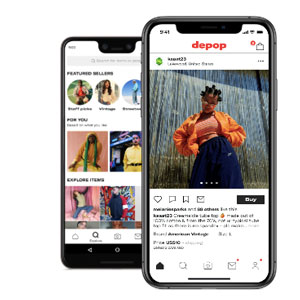
Depop, the popular app where users buy and sell secondhand fashion, jewelry, and accessories, has been in hyper-growth mode for several years. Last year it opened two brick-and-mortar locations, one in Los Angeles and the other in New York City, and in June it closed a Series C funding round of $62 million.
But the London-based company’s digital platform is being used for more than buying and selling, an exposé from Business of Fashion (BoF) says. Like Facebook, Twitter, and virtually every other social platform on the planet that allows users to private message, Depop is riddled with predators messaging inappropriate comments to users that, collectively, are about as young as they come.
The app allows users age 13 and up. And because Depop is a fashion retailing app, many users post photos of themselves wearing the clothes, jewelry, and accessories they’re selling.
The BoF article, published today, profiles several young users who say it’s common knowledge that flipping fashion on Depop comes hand in hand with fielding creepy messages from users solely on the app to make contact with its young sellers.
“Inquiries that I thought were supposed to be about my [clothing] items were instead about my feet, my body, or if I could wear the clothes a few more times before I sold it,” Depop user Lily Garcia told BoF. “Kids are using Depop to buy clothes and make money, but there are tons of these creeps on it trying to get their kick…. I’ve sold to minors, and I bet their parents for sure don’t know what type of messaging they’re getting. And that’s really scary.”
Another user, Nikol Kantardzhieva, told the outlet, “There have been instances where I have had to delete my items for sale as it would constantly receive the same messages from men.”
Depop is young a platform, but it’s already huge in every way.
Founded in 2011, it’s raised more than $100 million in funding. It has 16 million registered users and estimates that 90% of those users are under the age of 26. Depop users send about 20 million private messages a month and have sold sold more than $500 million worth of merchandise, BoF reports. Perplexingly, the company has a staff of around only 219 individuals.
As with other major social platforms, its size and scope make it easy for predators to move around freely and communicate with other users unfettered. The company says it deletes predatory user accounts it finds. But users say its net for catching bad actors is filled with holes.
In interviews with nearly a dozen Depop users, BoF reporters “heard numerous reports of women being inundated with sexual messages,” the outlet says. “The targets include minors, who told BoF they had been asked for nude photos, personal information, and to perform sexually suggestive activities like wearing clothes before users purchased them. In some cases, the harassment had gone on for years.”
The company didn’t respond to a request for comment, but Dominic Rose, Depop’s chief operating officer, told BoF that the brand has a “zero-tolerance approach” to harassment, and that the company is developing a tool “to detect abuse and harassment faster.”
Depop isn’t the only social platform attracting predators—far from it. In February, the U.K.’s National Society for the Prevention of Cruelty to Children reported that popular social app TikTok had become a “hunting ground” for child predators. And a spokesperson told CNET, “We know that a significant amount of children are being contacted via popular livestreaming apps, such as TikTok, by abusers.”
(Image courtesy of Depop)
Follow me on Instagram: @emilivesilind
- Subscribe to the JCK News Daily
- Subscribe to the JCK Special Report
- Follow JCK on Instagram: @jckmagazine
- Follow JCK on X: @jckmagazine
- Follow JCK on Facebook: @jckmagazine